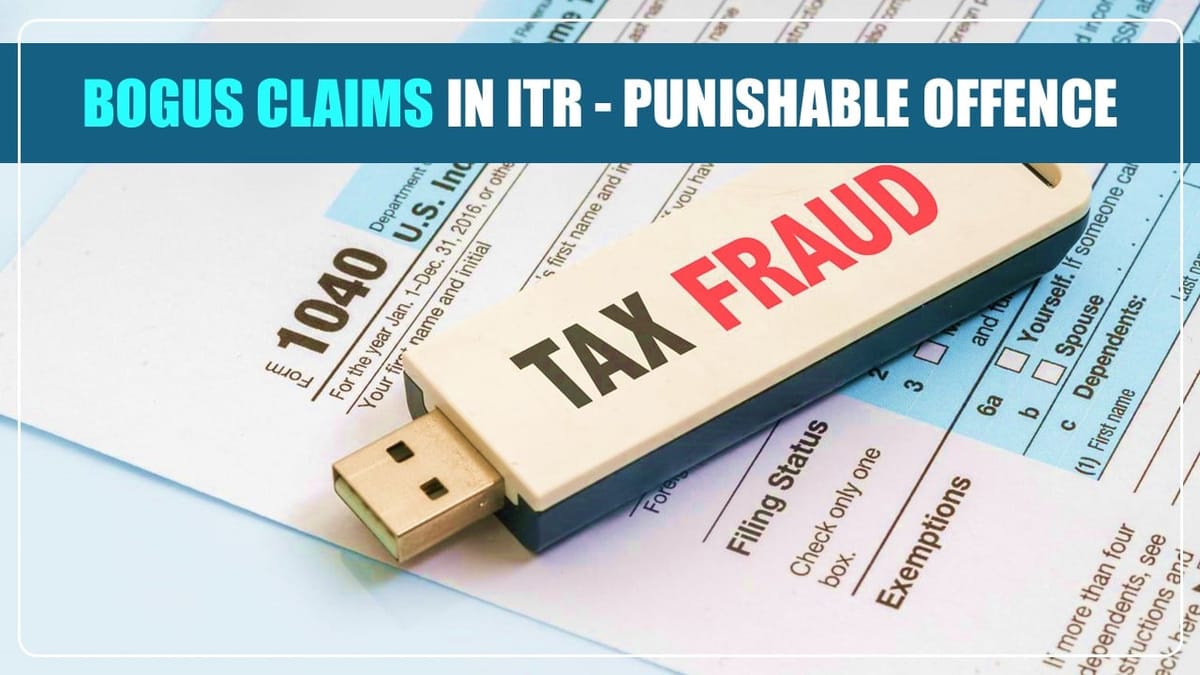The IT Department has asked ITR filers not to file fake claims for expenses, under-report their earnings, or exaggerate deductions, as this is a criminal offence that delays refunds.
Reetu | Jul 29, 2024 |

Bogus Claims to Get Refunds Punishable Offence; Warns IT Department
The IT Department has asked income tax return filers not to file for fake claims for expenses, under-report their earnings, or exaggerate deductions, as this is a criminal offence that delays refunds.
The ITR submitting season for assessment year 2024-25 is set to end on July 31 for those taxpayers whose accounts are not scheduled to be audited.
As of July 26, the Income Tax Department and its administrative body, the Central Board of Direct Taxes (CBDT), had seen the submission of more than five crore ITRs.
In a recent public statement, the Income Tax Department requested that people file their forms appropriately in order to receive timely refunds.
“Refund claims are subject to verification, which may result in delays. Accurate ITR filing leads to faster refund processing. Any discrepancies in the claims made will result in a request for a revised return (to be filed by the taxpayer),” it stated.
It advised ITR filers not to claim “incorrect” Tax Deducted at Source (TDS) amounts, “under-report” their income, “exaggerate” deductions, or submit claims for “bogus” expenditures. The department informed the taxpayers that their declarations must be “correct and accurate.” “Filing a false or bogus claim is a punishable offence,” according to the public announcement.
Under the former ITR filing regime, taxpayers could claim a variety of deductions and exemptions to reduce their tax payment, but those who choose the new regime would have a lower tax rate but could not take advantage of these benefits.
CBDT Chairman Ravi Agrawal recently told the media at a post-budget review that more than 66% of ITR submissions this year were made under the new regime, which is being promoted by the government to improve and simplify the direct tax system.
The communication added that if due refunds are delayed, taxpayers should check their e-filing account to see if a message has been sent by the IT department to them in this regard, and if so, reply through the “pending action and worklist section” button.
CBDT head Agrawal was also questioned on the new Budget proposal to increase the refund period to 60 days from the date of assessment or reassessment, rather than the current 30 days. He replied that such cases “would not be very substantial in numbers.”
“This generally in those cases where there has been a demand exists already in the case of the same assessee or the demand is likely to arise,” adds Agrawal.
Assume, he added, that the refund has been generated, but the assessment process is ongoing, and it is expected that a demand would arise.
The requirements state that once the assessment is finished, the assessee has 30 days to pay the demand. So, demand is due 30 days after the evaluation, and in order to adjust the refund, that 30-day period is required, as is this timeframe.
In case of any Doubt regarding Membership you can mail us at [email protected]
Join Studycafe's WhatsApp Group or Telegram Channel for Latest Updates on Government Job, Sarkari Naukri, Private Jobs, Income Tax, GST, Companies Act, Judgements and CA, CS, ICWA, and MUCH MORE!"